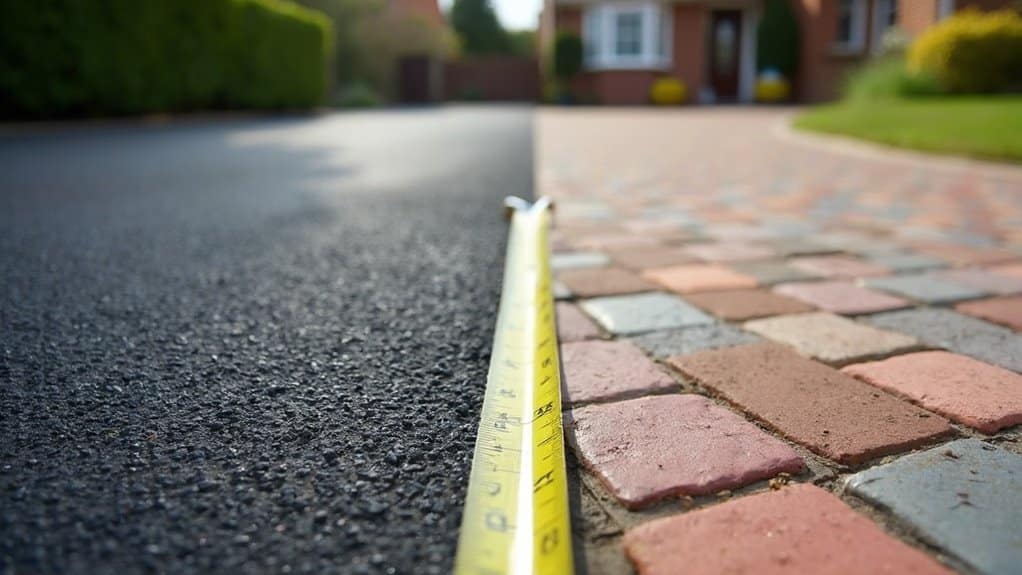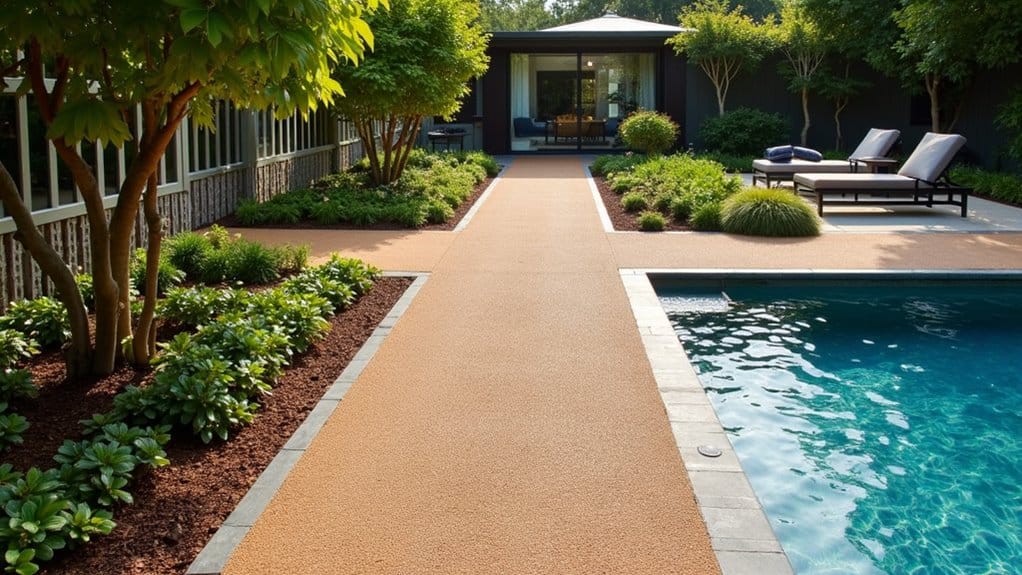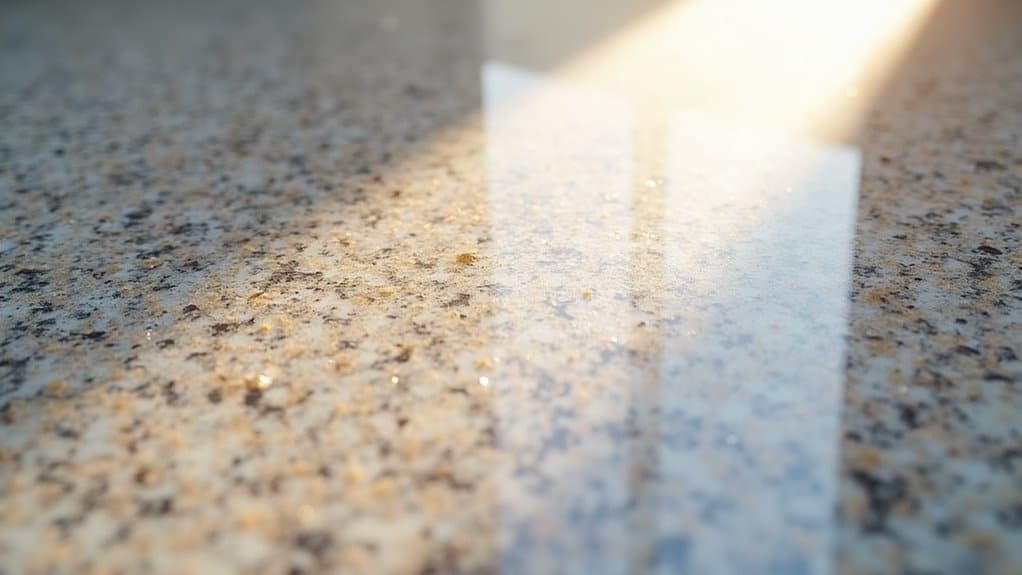A tarmac driveway is typically more affordable than block paving when it comes to initial costs. Tarmac usually costs between £70 and £110 per square metre, while block paving can set you back £10 to £40 per square foot. Tarmac installations are quicker too, often finished in just 1 to 2 days, and they require less maintenance, leading to lower ongoing costs.
However, if you're prioritising aesthetics and durability, you might lean towards block paving. It offers a more visually appealing finish and can be more resilient in the long run. Consider your specific needs and preferences before making a decision.
Table of Contents
ToggleKey Takeaways
Tarmac driveways usually cost between £70 and £110 per square metre, while block paving ranges from £10 to £40 per square foot, making tarmac the pricier option overall.
Although block paving has higher initial costs, it offers more design flexibility, which can enhance your property's value.
When it comes to installation, tarmac is quicker, typically taking just 1 to 2 days, whereas block paving can take several days due to its more intricate laying process.
In terms of maintenance, tarmac tends to be cheaper over time, with repairs costing less than those for block paving.
Tarmac generally lasts 15 to 20 years, while block paving can last longer with proper upkeep, which impacts its long-term cost-effectiveness.
Cost Analysis of Tarmac Driveways
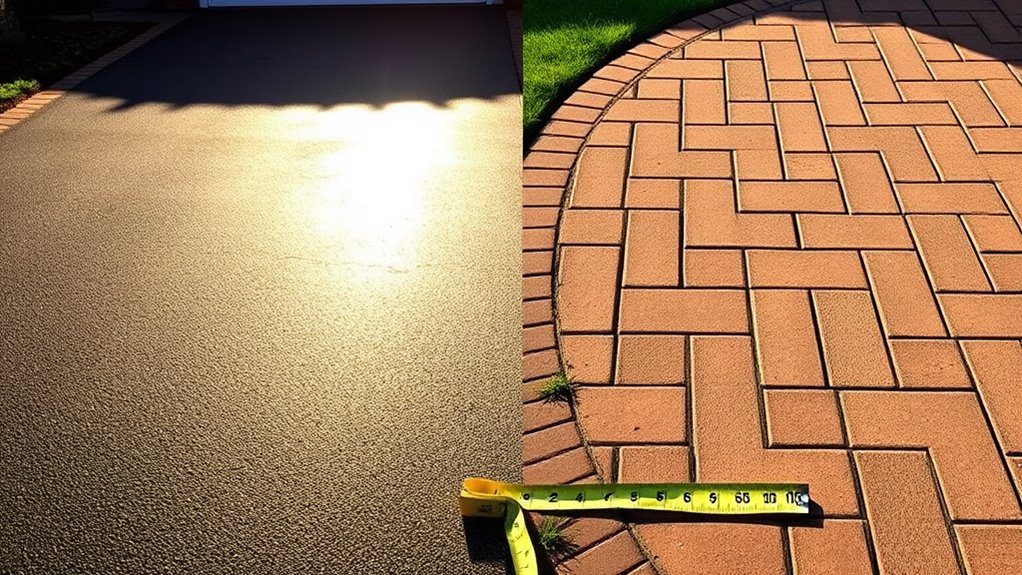
When considering a tarmac driveway, it's important to analyse the costs involved to make a well-informed decision. The quality of materials you choose will affect both your initial outlay and long-term maintenance. Tarmac, made from crushed stones, sand, and bitumen, is usually more cost-effective than block paving. However, going for cheaper materials might save you money at first but could lead to higher repair costs later on. Additionally, the traditional black tarmac costs around £70-£110 per m², which can influence your overall budget. Location also plays a crucial role in pricing. For example, installation costs tend to be higher in urban areas due to increased labour costs and local regulations. While tarmac driveways appeal to budget-conscious homeowners, their long-term maintenance costs can add up if regular upkeep is neglected.
Block Paving Pricing Breakdown
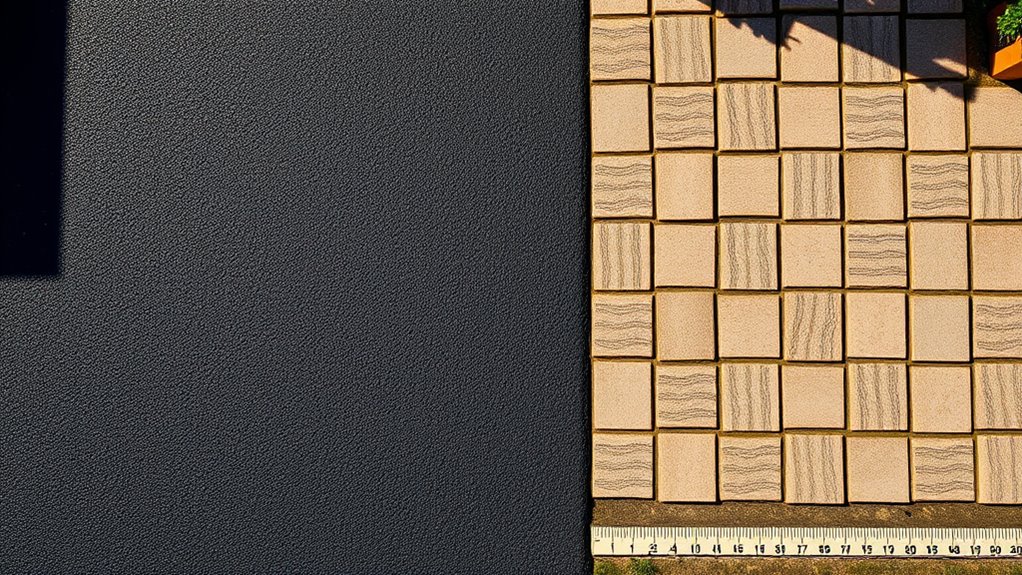
Block Paving Pricing Breakdown
Understanding the pricing of block paving is crucial for effective budget planning. Typically, costs range from £10 to £30 per square foot, depending on the materials you choose. For example, brick pavers can cost between £10 and £35 per square foot, while cobblestone might go up to £40. Additionally, paver driveways generally cost more upfront than asphalt or concrete, which can affect your overall budget. Labour costs usually make up around half of the total price, as more complex designs require skilled tradespeople, which can increase both time and costs. Keep in mind that local factors, such as regional labour rates and material availability, can also impact pricing. Don't forget to budget for regular maintenance and potential repairs to ensure your investment lasts.
Installation Time Comparison
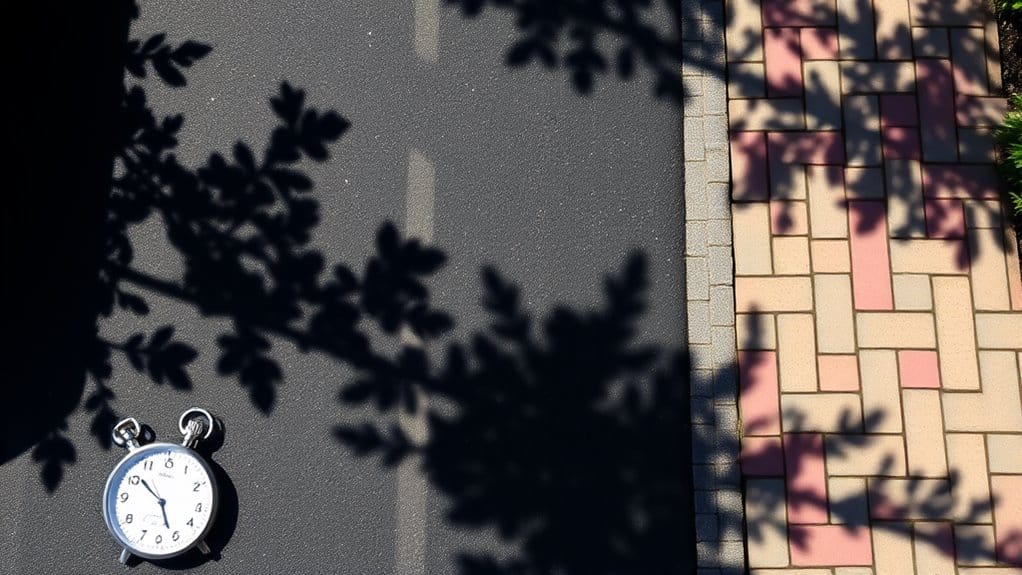
Understanding the installation time for your driveway is crucial, as it can significantly influence your project timeline and overall satisfaction.
Tarmac installation is generally more efficient, usually completed within 1 to 2 days due to its straightforward process. In contrast, block paving can take several days because of its labour-intensive nature and complex design requirements. Tarmac typically has fewer preparation needs, allowing for a quicker setup, whereas the intricate designs of block paving extend the installation period. Additionally, curing time for tarmac is shorter compared to block paving, contributing to its faster overall installation. This efficiency is largely attributed to the quick installation process associated with tarmac driveways.
Weather conditions can impact both methods, but tarmac can be laid in a wider range of conditions. For larger areas, tarmac is often the quicker option, making it the preferred choice when time is a key factor.
Durability and Maintenance Considerations
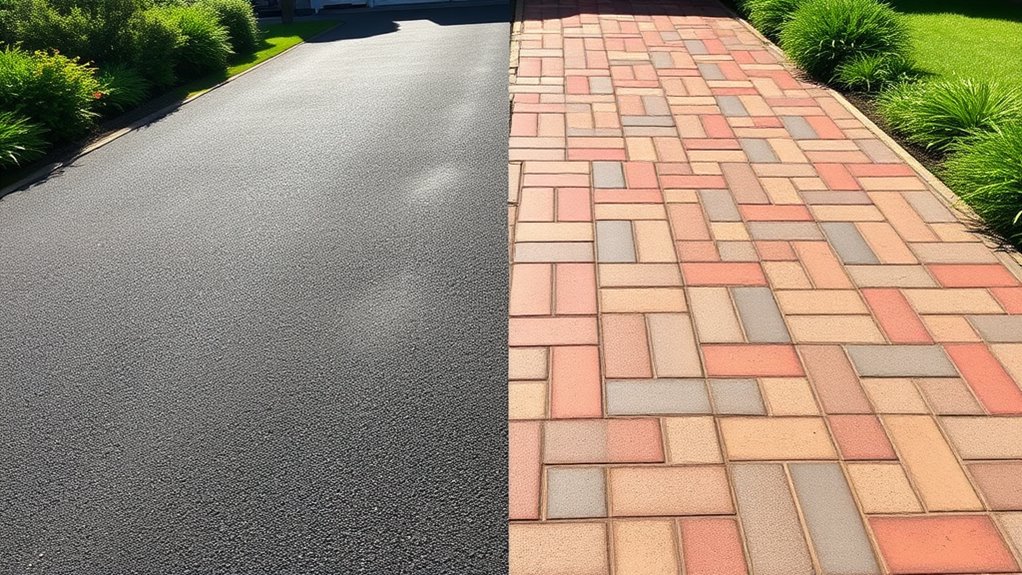
Installation time can significantly influence the longevity and maintenance of your driveway. Tarmac driveways generally last between 15 to 20 years, with proper care potentially extending this to 25 years. Factors affecting longevity include the quality of the installation, local climate, and how the driveway is used.
Tarmac requires minimal maintenance, but it's important to clean and seal it every 3-5 years to protect against UV damage and prolong its lifespan. Regular sealing is essential for good condition and longevity.
When it comes to repairs, tarmac is usually cheaper to fix than block paving, as addressing cracks and stains promptly can prevent further damage.
However, be aware that extreme weather and heavy vehicles can speed up wear, so it's crucial to manage traffic levels and ensure proper drainage to maintain the integrity of your tarmac over time.
Aesthetic Appeal and Design Options
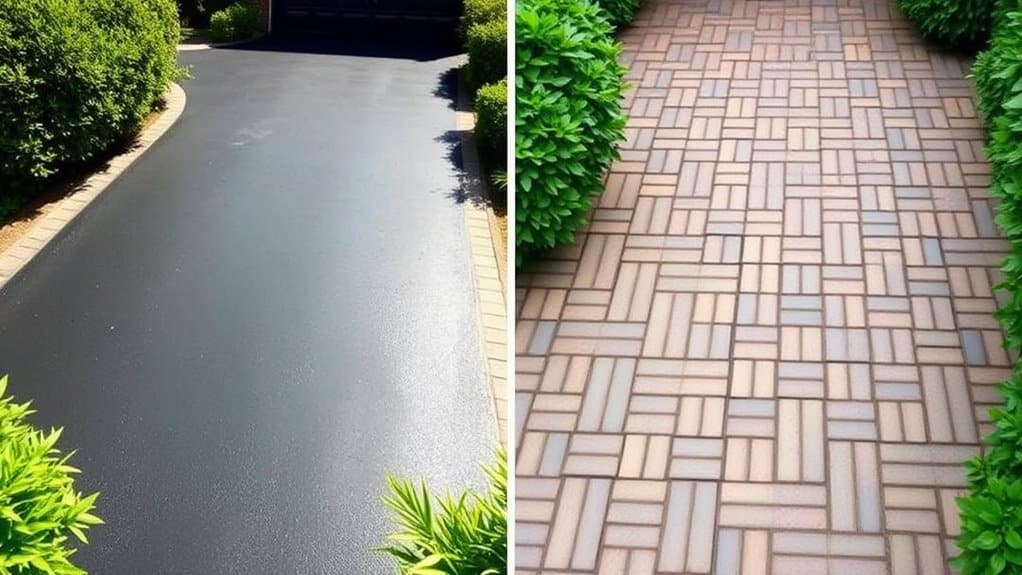
When choosing a driveway, aesthetic appeal and design options are crucial. Tarmac provides a smooth, traditional look that's practical, but it usually comes in just black, offering limited customisation. You can add borders or aprons for a bit of flair, but the options are quite restricted compared to block paving.
In contrast, block paving offers a wide range of colours, shapes, and textures, giving you much more flexibility in design. This material can significantly enhance your property's curb appeal, adding character and elegance.
If you want a driveway that reflects your personal style, block paving allows you to create a design that complements your home's architecture, greatly boosting its overall visual impact.
Frequently Asked Questions
How Do Weather Conditions Affect Tarmac and Block Paving Durability?
Weather conditions significantly affect the durability of tarmac and block paving. Tarmac tends to be less resilient, meaning it can crack during extreme weather changes. For example, heavy rain followed by frost can weaken its structure. In contrast, block paving is generally more durable, effectively handling weather fluctuations. Its design allows for better drainage, reducing the risk of water damage and ensuring it remains sturdy over time.
Can I Install Tarmac or Block Paving Myself?
Installing tarmac or block paving yourself can be a rewarding project, but it requires the right tools and materials. For both methods, you'll need essentials such as shovels, rakes, and compactors. Each type has its own specific requirements, so consider your skills and what fits best for your outdoor space. If you're handy and enjoy DIY, it can be a great way to enhance your property, but make sure you're prepared for the work involved.
What Is the Lifespan of Tarmac Versus Block Paving?
Tarmac generally lasts between 15 to 20 years, whereas block paving can last over 30 years if well maintained. Your decision should reflect how long you want your driveway to last and how much upkeep you're willing to invest. For instance, if you prefer a low-maintenance option, tarmac might be suitable, but if you want something that lasts longer with a bit more care, consider block paving.
Are There Any Eco-Friendly Options for Driveways?
Driveways don't have to be dull, grey slabs of asphalt! Consider eco-friendly options like permeable paving or recycled materials. These choices are not only better for the environment but also stylish and practical. For instance, permeable blocks allow rainwater to drain through, helping to reduce flooding and improve groundwater levels. Meanwhile, using recycled materials can give your driveway a unique look while being kind to the planet.
How Do Property Values Change With Different Driveway Materials?
Different driveway materials can significantly affect your property's resale value. High-quality options like block paving or resin-bound surfaces enhance the overall look of your home, improving curb appeal and drawing in potential buyers. In more affluent areas, a well-designed driveway can boost property values, making it a smart investment for homeowners. For instance, a neat, gravel driveway may suffice in a rural setting, but in a suburban neighbourhood, a stylish, paved driveway could make all the difference in attracting offers.
Conclusion
When comparing the costs of tarmac driveways and block paving, tarmac generally comes out as the cheaper choice. However, it's important to consider not only the upfront cost but also the long-term durability and maintenance requirements. Think of it like choosing between a quick fix and a lasting solution; both have their advantages. Ultimately, your choice should reflect your priorities in terms of appearance, durability, and maintenance, ensuring that your driveway enhances your home while staying within your budget.
Prepare the perfect base for your resin bound stone installation and discover the crucial factors that ensure lasting durability.
Know where resin bound surfacing can transform spaces for both residential and commercial use, and discover the countless benefits that Read more
A stone carpet combines beauty and resilience in flooring, but what makes quartz floors uniquely beneficial? Discover the secrets behind Read more

